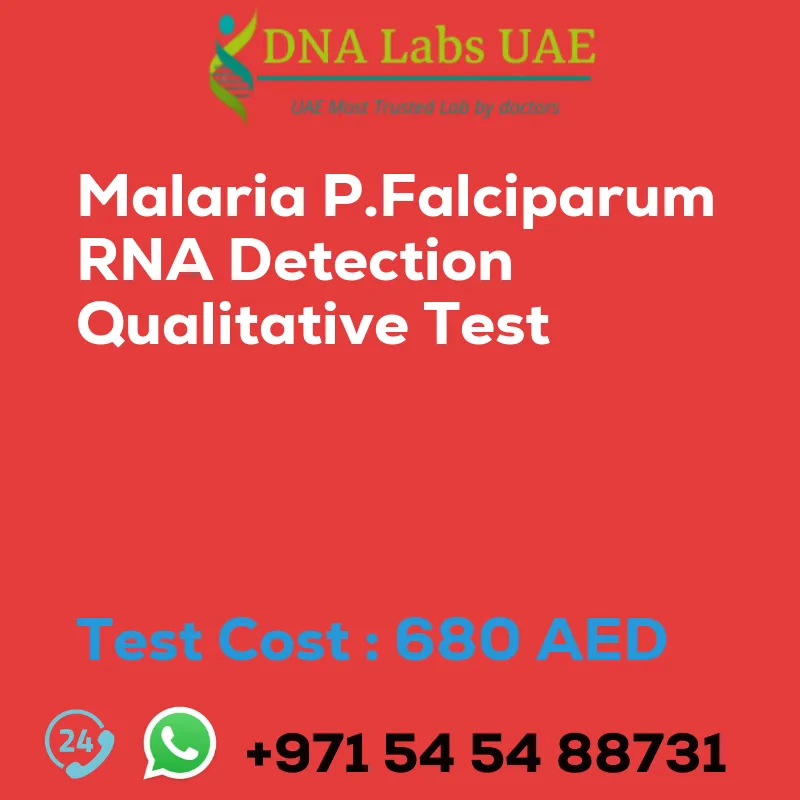Malaria P.Falciparum RNA Detection Qualitative Test
Test Name: Malaria P.Falciparum RNA Detection Qualitative Test
Components: Whole Blood, dried spot.
Price: 680.0 AED
Sample Condition: Whole Blood, dried spot.
Report Delivery: 3rd Working Day Email: 36 hours. On phone: 24 hours
Method: Real Time PCR
Test type: Viral
Doctor: Physician
Test Department: Genetics
Pre Test Information: Need to sign Consent document and bring any clinical history of patient for Malaria (P.Falciparum) (RNA Detection) Qualitative Test
Test Details:
The Malaria (P. falciparum) RNA detection qualitative test is a diagnostic tool used to detect the presence of RNA from the Plasmodium falciparum parasite in a patient’s blood sample. This test is typically used in areas where malaria is endemic and can help in the early detection and treatment of the disease.
The test works by extracting RNA from the patient’s blood sample and then using a technique called reverse transcription-polymerase chain reaction (RT-PCR) to amplify and detect specific RNA sequences from the P. falciparum parasite. The RT-PCR technique converts the RNA into complementary DNA (cDNA) and then amplifies it using specific primers that target the P. falciparum RNA.
If the P. falciparum RNA is present in the patient’s blood sample, the RT-PCR technique will amplify the specific RNA sequences, and the presence of the amplified DNA can be detected using various methods, such as gel electrophoresis or fluorescence-based detection systems.
A positive result from the Malaria (P. falciparum) RNA detection qualitative test indicates the presence of the P. falciparum parasite in the patient’s blood, confirming a diagnosis of malaria caused by this specific parasite. This information is crucial for the appropriate treatment and management of the disease.
It’s important to note that this test detects the presence of RNA from the P. falciparum parasite, which is one of the four main species of Plasmodium that cause malaria in humans. Other species, such as P. vivax, P. malariae, and P. ovale, may require different diagnostic tests for detection.
Overall, the Malaria (P. falciparum) RNA detection qualitative test is a valuable tool in the diagnosis and management of malaria caused by the P. falciparum parasite. It provides a rapid and accurate method for detecting the presence of this specific parasite in a patient’s blood sample, allowing for early intervention and treatment.
| Test Name | Malaria P.Falciparum RNA Detection Qualitative Test |
|---|---|
| Components | |
| Price | 680.0 AED |
| Sample Condition | Whole Blood,dried spot. |
| Report Delivery | 3rd Working Day Email:-36 hours.On phone: 24 hours |
| Method | Real Time PCR |
| Test type | Viral |
| Doctor | Physician |
| Test Department: | Genetics |
| Pre Test Information | Need to sign Consent document and bring any clinical history of patient forMalaria (P.Falciparum) (RNA Detection) QualitativeTest |
| Test Details |
The Malaria (P. falciparum) RNA detection qualitative test is a diagnostic tool used to detect the presence of RNA from the Plasmodium falciparum parasite in a patient’s blood sample. This test is typically used in areas where malaria is endemic and can help in the early detection and treatment of the disease. The test works by extracting RNA from the patient’s blood sample and then using a technique called reverse transcription-polymerase chain reaction (RT-PCR) to amplify and detect specific RNA sequences from the P. falciparum parasite. The RT-PCR technique converts the RNA into complementary DNA (cDNA) and then amplifies it using specific primers that target the P. falciparum RNA. If the P. falciparum RNA is present in the patient’s blood sample, the RT-PCR technique will amplify the specific RNA sequences, and the presence of the amplified DNA can be detected using various methods, such as gel electrophoresis or fluorescence-based detection systems. A positive result from the Malaria (P. falciparum) RNA detection qualitative test indicates the presence of the P. falciparum parasite in the patient’s blood, confirming a diagnosis of malaria caused by this specific parasite. This information is crucial for the appropriate treatment and management of the disease. It’s important to note that this test detects the presence of RNA from the P. falciparum parasite, which is one of the four main species of Plasmodium that cause malaria in humans. Other species, such as P. vivax, P. malariae, and P. ovale, may require different diagnostic tests for detection. Overall, the Malaria (P. falciparum) RNA detection qualitative test is a valuable tool in the diagnosis and management of malaria caused by the P. falciparum parasite. It provides a rapid and accurate method for detecting the presence of this specific parasite in a patient’s blood sample, allowing for early intervention and treatment. |








